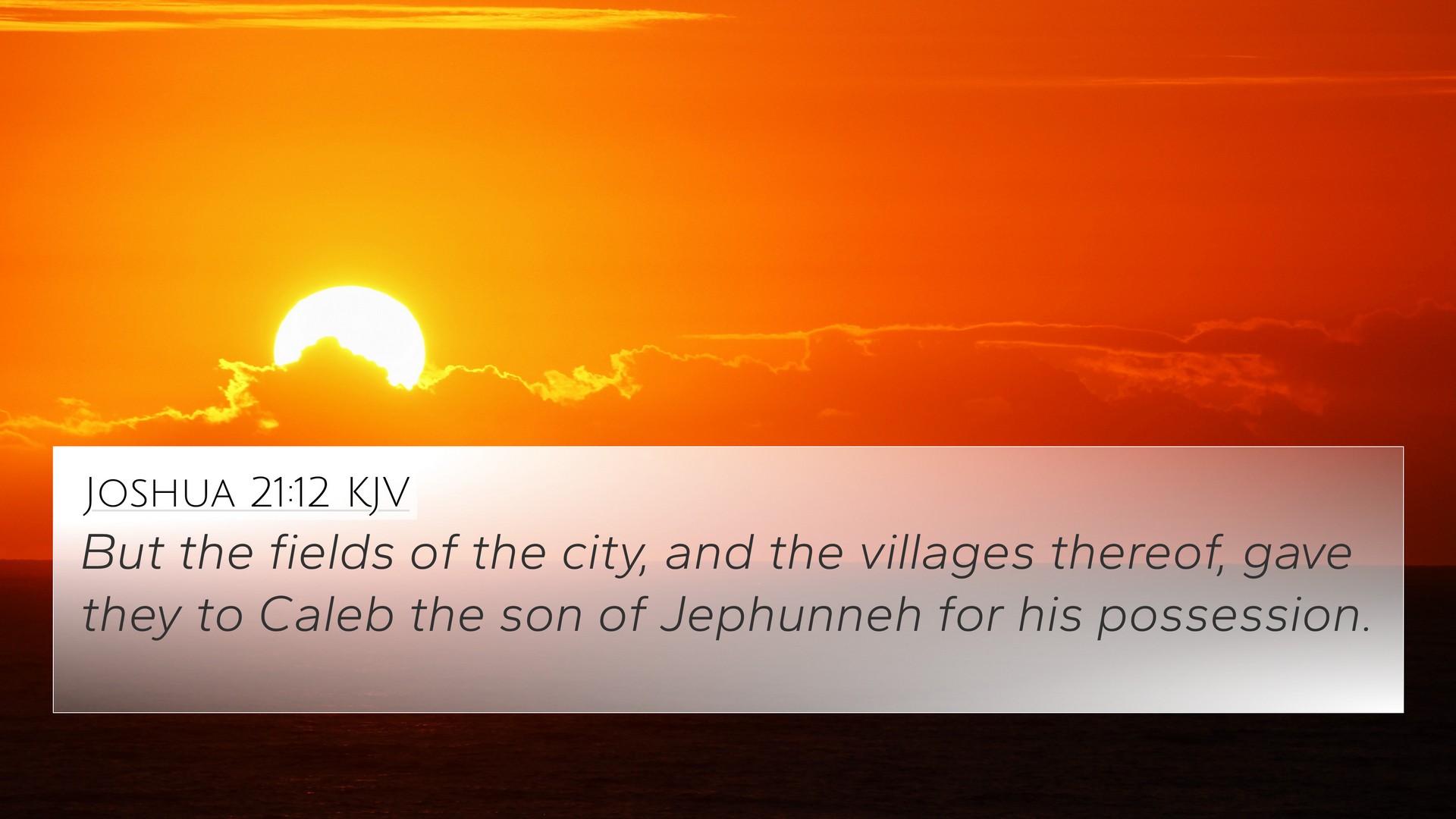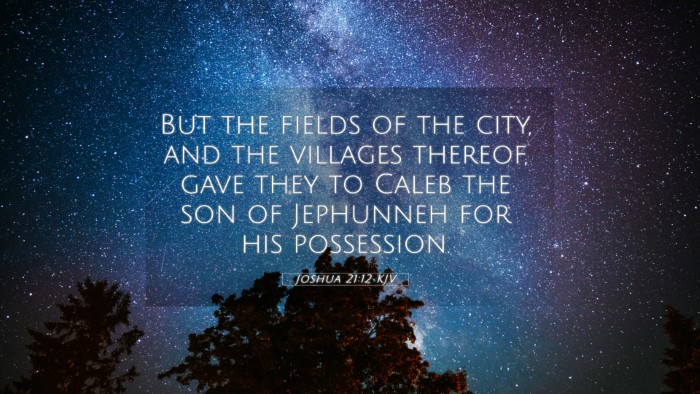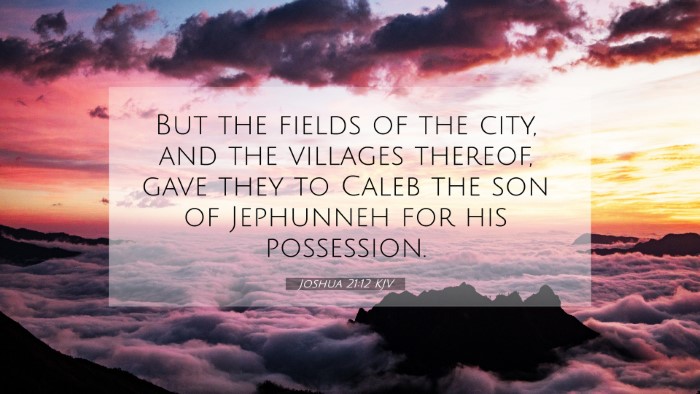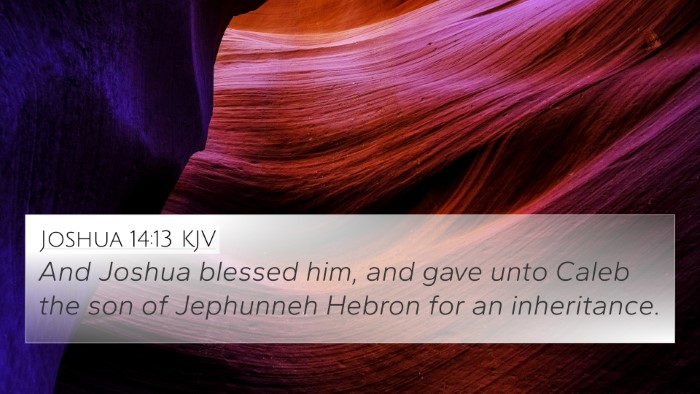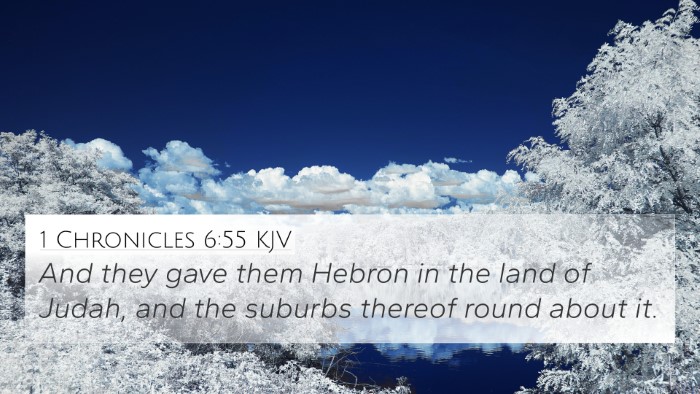Understanding Joshua 21:12
Joshua 21:12 reads, "But the fields of the city and the villages thereof gave they to Caleb the son of Jephunneh for his possession." This verse holds significant meaning in the context of Israel's inheritance of the Promised Land, illustrating themes of loyalty, faithfulness, and the fulfillment of God's promises.
Commentary Insights
Commentaries from Matthew Henry, Albert Barnes, and Adam Clarke provide valuable interpretations of this verse. They help us gain a deeper understanding of its implications and connections with other scriptural references.
Matthew Henry's Commentary
Matthew Henry emphasizes how Caleb, having remained faithful, receives a reward for his loyalty to God and His promises. The allocation of the city and its fields highlights God's faithfulness in rewarding those who persevered in their faith, as seen in Caleb's dedicated service and trust in God during the Israelite's wilderness journey.
Albert Barnes' Commentary
Albert Barnes points out that the phrase “the fields of the city” indicates God’s providence in granting land to His faithful servants. Barnes highlights the importance of understanding the geographical and historical context of this inheritance, linking it to the larger narrative of Israel's conquest and the fulfilment of God's covenant with Abraham.
Adam Clarke's Commentary
Adam Clarke provides insight into the significance of Caleb's inheritance. He explains how it signifies God's promise fulfilled. By giving the land to Caleb, Clarke states, God affirms the truth of His covenant and the blessings promised to those who are faithful. Clarke also draws parallels with the New Testament regarding the reward for faith.
Significance of Land Inheritance
The inheritance of land symbolizes much more than mere property; it represents the fulfillment of God's promises and the tangible blessings bestowed upon His people. This act of assigning land to Caleb serves as a reward for his unwavering faith compared to others who faltered during the desert years.
Bible Verse Cross-References
- Numbers 14:24: "But my servant Caleb, because he had another spirit with him, and hath followed me fully, him will I bring into the land whereinto he went; and his seed shall possess it."
- Joshua 14:9: "And Moses swore on that day, saying, 'Surely the land whereon thy feet have trodden shall be thine inheritance, and thy children's forever, because thou hast wholly followed the Lord my God.'"
- Deuteronomy 1:36: "Save Caleb the son of Jephunneh; he shall see it, and to him will I give the land that he hath trodden upon, and to his children, because he hath wholly followed the Lord."
- Hebrews 11:6: "But without faith it is impossible to please him: for he that cometh to God must believe that he is, and that he is a rewarder of them that diligently seek him."
- Joshua 15:13-14: "And unto Caleb the son of Jephunneh he gave a part among the children of Judah... and Caleb drove thence the three sons of Anak, the giants."
- 1 Chronicles 6:54: "Now these are their dwelling places throughout their castles in their coasts, of the sons of Aaron; for the lot was theirs."
- Psalms 37:29: "The righteous shall inherit the land, and dwell therein forever."
Thematic Connections and Applications
The connections between Bible verses can enhance our understanding and application of Scripture. The theme of inheritance for the faithful connects not just Caleb’s experience but also the broader biblical narrative of God’s promises.
Exploring Connections between Bible Verses
Linking Bible scriptures helps reveal the interconnectedness of the biblical texts. For instance, followers of Christ are also promised inheritance in heavenly realms (Ephesians 1:11), paralleling Caleb's earthly inheritance.
Bible Reference Resources
For those interested in exploring further, tools for Bible cross-referencing can enhance your study. Utilizing a Bible concordance or a cross-reference Bible study guide can provide detailed insights into how various scriptures relate to one another.
Cross-Referencing Biblical Texts
Learning how to use Bible cross-references enhances our comprehension and facilitates a deeper study of God's word. Cross-referencing Bible study methods reveal layers of meaning, especially in themes like faith, divine inheritance, and God’s promises.
Conclusion
Joshua 21:12 exemplifies the fulfillment of God's promise and reward for faithfulness through the character of Caleb. By examining this verse alongside other related scriptures, we are encouraged to reflect on our own faith and the promises God holds for those who diligently seek Him.
Practical Application
As believers today, we are called to emulate Caleb’s unwavering faith and reliance on God. By contemplating these cross-references, we can gain insights that not only connect stories from the past but also apply to our lives in contemporary faith journeys.
